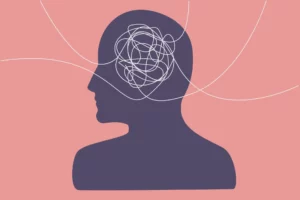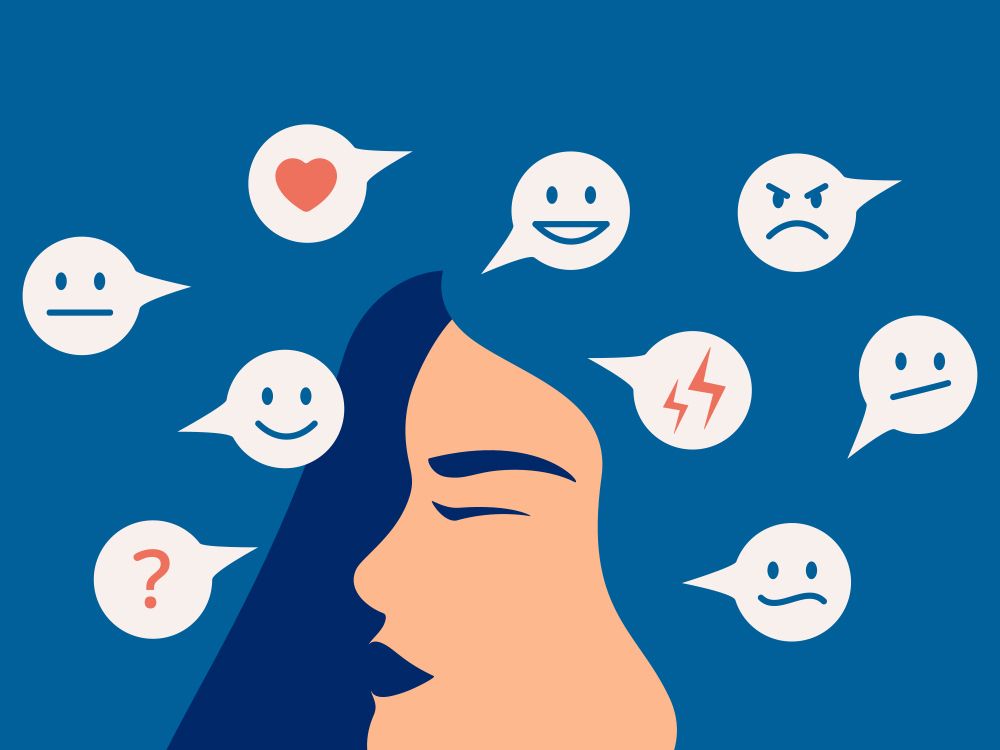Do you ever have thoughts that just won’t go away? Thoughts that seem to invade your mind, even when you don’t want them to? These are called compulsive thoughts, and they can be very difficult to deal with. In this blog post, we will discuss what compulsive thoughts are, the symptoms of this disorder, and how to get help.
Contents
What Are Compulsive Thoughts?
 Compulsive thoughts are recurring, intrusive thoughts that cause distress or anxiety. These thoughts can be persistent and difficult to control or ignore. OCD or Obsessive Compulsive Disorder is a mental health condition associated with compulsive thoughts, but not everyone who experiences compulsive thoughts has OCD.
Compulsive thoughts are recurring, intrusive thoughts that cause distress or anxiety. These thoughts can be persistent and difficult to control or ignore. OCD or Obsessive Compulsive Disorder is a mental health condition associated with compulsive thoughts, but not everyone who experiences compulsive thoughts has OCD.
More often than not, compulsive thoughts are of a negative nature and involve recurring themes. It is estimated that nearly 50% of people suffer from some degree of compulsive thinking, including anxiety or negative thoughts that can lead to depression.
There are several types of compulsive thoughts, including:
- Rumination: repetitively thinking about a problem or situation without finding a solution.
- Obsessive thoughts: intrusive and persistent thoughts that focus on certain topics or themes, such as cleanliness, safety, or morality.
- Worrying: excessive worrying about potential dangers or other negative outcomes.
- Fear of the unknown: fear and anxiety about the future or what might happen.
All in all, compulsive thoughts can be distressing and difficult to ignore. It is important to remember that you are not alone in this struggle, and there are many helpful resources available for those who need help in managing their compulsive thoughts.
What Are Some Examples Of These Thoughts?
Compulsive thoughts are intrusive, unwanted, and uncontrollable. They often take the form of obsessive worries or repetitive mental images that can be distressing. Common examples of compulsive thoughts include:
- Being overly concerned with perfectionism or control
- Having thoughts of violence or danger that seem to come out of nowhere
- Recurrent fears or worries about a specific topic, such as health, money, relationships, etc.
- Engaging in excessive rumination (constantly revisiting and rethinking the same topics)
- Obsessing over potential outcomes or decisions
- Having intrusive desires or urges that seem to come from outside of oneself
- Being consumed with negative thoughts about one’s self-worth
These kinds of thoughts can be exhausting, as they tend to lead to anxiety and distress. It is important to seek help if you are struggling with compulsive thoughts, as there are effective treatments available for this condition. The examples above are just a few possibilities, there are many other types of intrusive thoughts that can be classified as compulsive.
What Triggers Compulsive Thoughts?
 There could be several triggers of compulsive thoughts, some of these are discussed below:
There could be several triggers of compulsive thoughts, some of these are discussed below:
- Stress and Anxiety: Studies have shown that stress and anxiety can be major contributors to compulsive thoughts. When a person is stressed, they may start obsessing about an issue or worry excessively about something. This can lead to obsessive thinking, which in turn can cause compulsions.
- Depression: People who suffer from depression may be more likely to have compulsive thoughts due to their low mood. Depression can lead to a person ruminating on negative thoughts, which can become part of a cycle of obsessive thinking.
- Mental Illness: People who have been diagnosed with mental illnesses such as OCD or PTSD may be more likely to experience compulsive thoughts due to their disorder.
- Substance Abuse: Substance abuse can contribute to compulsive thoughts since the effects of drugs and alcohol may cause a person to think obsessively.
These triggers can lead to a person thinking obsessively about something, and it is important for people to be aware of them so that they can address their compulsive thoughts before it becomes overwhelming. In addition, there could be some environmental factors that can triger compulsive thinking, such as;
- Living in a high-stress environment
- Smoking or drinking alcohol
- Lack of sleep
- Having experienced a traumatic event
- Certain medications
It is important to address these potential triggers and make changes in our lives that can reduce the chances of becoming overwhelmed with these thoughts. Additionally, seeking professional help or engaging in self-care activities can be beneficial for treating obsessive thinking patterns.
How Do You Stop Compulsive Thoughts Naturally?
If you are struggling with compulsive thoughts, it’s important to remember that there is hope. You can stop or manage these intrusive thoughts naturally by engaging in healthy coping strategies and developing a positive attitude toward life. Here are some ways to start:
Challenge Your Negative Thoughts
The first step in dealing with these thoughts is to recognize them for what they are – negative, intrusive, and irrational. When these thoughts arise, challenge them with facts and data that prove them wrong. This will help you gain control of the situation and reduce your feelings of anxiety or stress.
Distract Yourself
When compulsive thoughts start to become overwhelming, it can be helpful to distract yourself with an activity or task that can help you focus on something else. For example, listening to music, playing a game, reading a book, or going for a walk can be great ways to redirect your thoughts.
Practice Mindfulness
Mindfulness is the practice of being present and aware of the present moment. It allows you to observe your thoughts and feelings without judgment and can help you gain clarity and perspective on the issue at hand. Practicing mindfulness regularly can also help reduce stress, anxiety, and intrusive thoughts.
Get Enough Sleep
Sometimes, compulsive thoughts can be exacerbated by exhaustion or lack of sleep. Make sure you are getting enough restful sleep (7-9 hours per night) to help clear your mind and give yourself time to relax. Because when you’re tired, it’s more difficult to think clearly and realistically.
Avoid Nicotine and Alcohol
It is important to avoid drugs and alcohol if you are struggling with compulsive thoughts. These substances can increase anxiety and stress, making it more difficult to manage your intrusive thoughts. For example, nicotine and alcohol can interfere with your ability to focus, making it easier for thoughts to take over.
Reach Out to Loved Ones
 Finally, it’s important to know that you don’t have to tackle this issue alone. Reaching out to loved ones and talking about your struggles can be incredibly helpful in managing thoughts. Your family and friends can provide emotional support, help distract you from intrusive thoughts, and offer valuable insight into the problem.
Finally, it’s important to know that you don’t have to tackle this issue alone. Reaching out to loved ones and talking about your struggles can be incredibly helpful in managing thoughts. Your family and friends can provide emotional support, help distract you from intrusive thoughts, and offer valuable insight into the problem.
By challenging your negative thoughts, distracting yourself with activities, practicing mindfulness, getting enough sleep, avoiding nicotine and alcohol, and reaching out to loved ones for support, you can start to manage your thoughts naturally. Remember that it is possible to take control of your thoughts and feelings — all it takes is a little practice and patience!
Is Professional Help Needed?
Usually, compulsive thoughts are not a sign of mental illness and do not require professional help. However, if your thoughts are causing significant distress or impairing your daily functioning, it may be helpful to talk to a mental health professional. A therapist can provide guidance in identifying the triggers for your thoughts and developing strategies to manage them more effectively.
A few warning signs that indicate professional help may be necessary include:
- Difficulty controlling or stopping the thoughts, even for short periods of time
- A feeling of being overwhelmed by the thoughts or anxiety associated with them
- Reduced effectiveness at work or school due to the interference of compulsive thinking
- Inability to enjoy activities due to intrusive thoughts.
These signs can indicate that these thoughts are related to a more serious underlying mental health condition, such as obsessive-compulsive disorder (OCD). Which requires specialized treatment.
If you are experiencing any of these symptoms, it is important to talk to your doctor or trusted mental health professional for further evaluation and guidance. Some of the professional treatments might include:
- Talk therapy
- Exposure therapy
- Medication
- Lifestyle changes (such as exercise and stress management)
With the help of a professional and by making positive changes in your life, it is possible to manage compulsive thinking effectively. It requires commitment and patience but with the right approach, you can regain control over your thoughts.
Conclusion
In a nutshell, compulsive thoughts may not necessarily indicate a mental health disorder. But could be a sign of underlying issues. It is important to recognize the warning signs, such as difficulty controlling or stopping the thoughts and being overwhelmed by them, so that you can get help when necessary.
A mental health professional can provide guidance in managing compulsive thinking effectively through a combination of therapies and other relaxation techniques. These approaches can help you identify the underlying causes of your compulsive thinking and develop a comprehensive plan to break its grip on your life.
For more information and guidance, please contact OCDMantra. OCD is a mental health disorder characterized by obsessions and compulsions. If you have any queries regarding OCD treatment, ERP therapy experienced therapists at OCDMantra can help: Book a trial OCD therapy session


